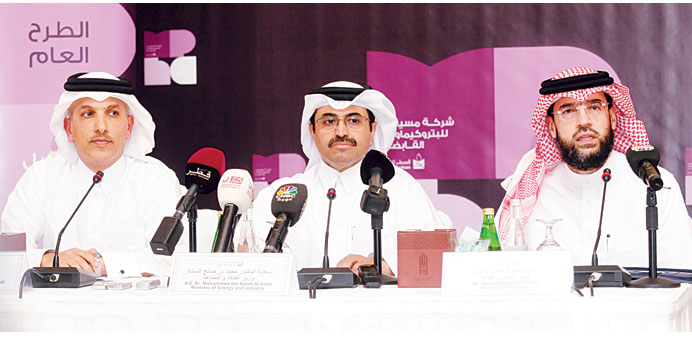From left: HE the Finance Minister Ali Sherif al-Emadi; HE the Energy and Industry Minister Dr Mohamed bin Saleh al-Sada and QP finance director Abdulrahman Ahmad al-Shaibi announce the IPO details of Mesaieed Petrochemical Holding Company (MPHC), a wholly-owned subsidiary of Qatar Petroleum. MPHC is offering 26% stake to public to raise as much as QR3.23bn, ending a three-year IPO drought in the country.
By Santhosh V Perumal
Qatar Petroleum (QP), the country’s bellwether entity that recently unveiled a new strategy to become a world-class oil giant, is contemplating a series of initial public offerings (IPOs) for its subsidiaries over the next 10 years, according to a top government official.
“This IPO is not an isolated event but is part of a series of IPOs that QP intends to undertake during the next 10 years,” Energy Minister HE Dr Mohamed bin Saleh al-Sada said after announcing the QR3.23bn maiden offer of Mesaieed Petrochemical Holding Company, a wholly-owned subsidiary of QP. The series of IPOs come under QP’s 10-year investment and savings programme that seeks to offer Qatari citizens the opportunity to share in the country’s current and future wealth.
Last week in a meeting of Supreme Council of Economic Affairs, which was chaired by HH the Emir Sheikh Tamim bin Hamad al-Thani, a presentation was made regarding the offering of shares worth QR50bn of several state-owned companies to Qataris over a period of 10 years.
Finance Minister HE Ali Sherif al-Emadi had said the first phase of the listing programme would begin by offering shares of Mesaieed Petrochemical Holding, Company which comprises three major industrial companies Q-Chem I, Q-Chem 2 and Qatar Vinyl Company.
On the announced plans to list four QP subsidiary companies on the Qatar Exchange with IPOs, Beltone Financial had said it could prove to be an important “equity-financing” vehicle for companies with direct exposure to World Expo 2020 in Dubai and FIFA World Cup 2022 in Qatar.
The market needs more depth and breadth, an analyst with a brokerage firm said, adding the time frame of 10 years is quite reasonable, considering the priorities set by the Qatar National Vision 2030.
“Now that QP has led from the front, investors confidence ought to strengthen, which in turn, will encourage other entities to come to the market,” he said.
Expecting IPO activity in the region to pick up, Ernst & Young said the key challenge is the relatively lower levels of liquidity in the bourses compared to international markets.
At present, the QE has 42 listed companies with 12 in the banks and financial services sector, eight each in industrials and the consumer goods, five in insurance, four in real estate, three in transport and two in the telecom sector.
‘Qatar among top 3 Mideast markets for firms doing business’
With more than $200bn worth of major projects due to be awarded up to 2030, Qatar remains one of the three top markets for companies doing business in and with the Middle East region, says a report.
“We are at the start of an era that will see the award of a series of massive construction contracts across Qatar’s infrastructure, transport, energy and utilities sectors. Qatar is now ranked the most important project in the Middle East after Saudi Arabia,” said Edmund O’ Sullivan, Meed Events chairman.
Already, Meed sees Qatar’s projects market experiencing significant activity in 2014 with infrastructure and transport contract awards expected to peak at $24bn. Doha alone has a considerable backlog of work to execute between 2014 and 2019, with associated contractor and third party opportunities valued at $90bn, including $40bn worth of roads, ports and rail work as well as $19bn construction projects.
In addition, Qatar’s petrochemicals industry offers the most opportunities to international EPC contractors, the report said.
According to Meed Projects, EPC contracts worth a total of $14.63bn are in the design and tender phases in Qatar. The majority of this figure is accounted for by two massive schemes, worth a combined $14bn, that is being planned for the Ras Laffan Industrial City.
Along with Qatar’s development comes an anticipated increase in population as well as the decoupling in gas prices. These and their impact on the country’s infrastructure and energy sector will be analysed by experts at Qatar Projects 2014, a conference that will be held here in March.
Meed Insight will also present a thorough quantitative and qualitative forecast of Qatar and GCC (Gulf Co-operation Council) Projects Market.
To deliver more sector-specific content as well as extended networking opportunities with Qatar’s government and public authorities, Qatar Projects 2014 Conference will feature two dedicated tracks; one which covers Qatar’s infrastructure & transport sector, and another which focuses on Qatar’s energy and utilities sector.
Qatar Projects 2014 will present a comprehensive review of the massive opportunities at stake, and provide international and regional stakeholders in-depth and fresh insights from key government agencies at the two day conference to be held in March.
HE the Qatar Central Bank Governor Sheikh Abdullah bin Saud al-Thani will deliver the keynote address at the conference.

